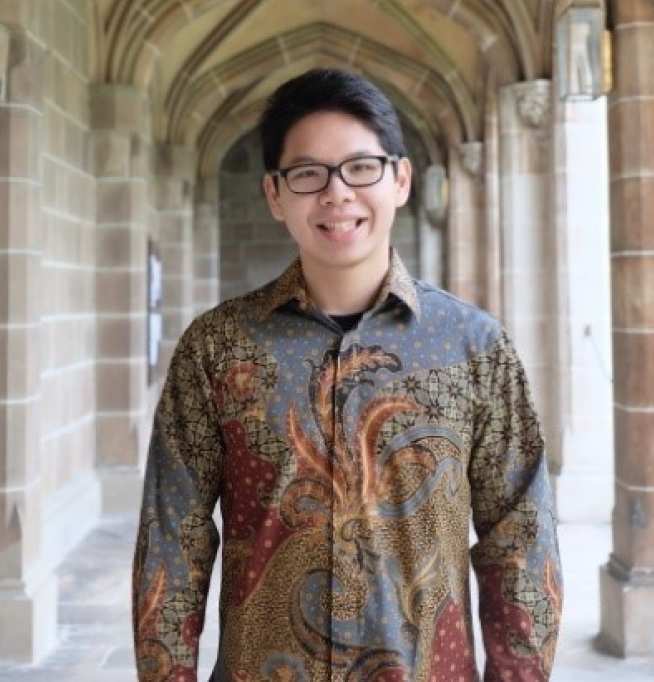
Could tell us a little about yourself and about your studies before coming to Imperial?
I'm originally from Indonesia. Before coming to Imperial, I earned a bachelor's degree in Mathematics and Computer Science from the University of Melbourne. Throughout my undergraduate degree, I was exposed to a wide range of probability and statistics modules, as well as a variety of computing topics.
During my time at Melbourne, I had the opportunity to complete several machine learning research internships. These included time at the Commonwealth Scientific and Industrial Research Organisation (CSIRO) Australia, where I was able to implement network diffusion algorithms to simulate and resolve the Sydney water pipe failures problem. I also worked at the Australian National University, where I collaborated with Professor Marcus Hutter of Google DeepMind to develop a novel reinforcement learning algorithm.
What attracted you about the MSc in AI?
What attracted me the most is the variety of AI modules offered, and the opportunities the degree provides for specialisation. Additionally, I really liked how Imperial focuses on both theoretical and practical aspects of machine learning. That way I can be prepared both for further research degrees and for AI applications in industry.
What are you enjoying the most?
I really enjoyed the learning atmosphere at Imperial College. I really like coming to lectures and discussing machine learning concepts with lecturers. It’s truly a blessing to be able to study at one of the world's leading universities and work with the world’s leading researchers. Apart from lectures, I also really enjoy talking and discussing with other students at Imperial. I feel that everyone is really motivated and passionate about what they’re doing. Everyone is working so hard which is kind of contagious.
What are you finding more challenging?
The most challenging thing in the degree is the rapid pace of lectures and its intense workload. I think the course encourages us to do our own independent study apart from revising lectures. This means that we need to study daily in order to get on top of the material and coursework.
Could you tell us about some of your achievements on the MSc that make you proud?
On the MSc in AI, I learned a lot about AI! I'm particularly proud about my individual project, where I was awarded the Distinguished Thesis mark for outstanding technical achievement and presentation on my thesis.
What did you do in your spare time?
In my spare time, I went to the gym, and attended a bible study session at my church. I found it important to be active to keep my body healthy. In addition, it was also essential to have a close community that helps each other, especially when I was so far away from home.
Could you tell us about your individual project?
Under the supervision of Professor Francesca Toni, I developed a novel, state-of-the-art counterfactual explanation method. Our algorithm can be applied to explain any ML classifier, providing explanations by highlighting changes in features for a different classification to materialize. For example, given a deep learning model that predicts whether to accept or reject bank customers’ loan applications, my algorithm highlights factors that customers can change for them to reverse the decision made by the ML classifier.
What have you been doing since you graduated?
Shortly after graduation, I decided to further pursue explainable AI research by enrolling in a research degree at the University of Cambridge. There, I met my supervisors (now co-founders) Botty and Dmitry who invited me to start Tenyks with them with the mission to invent the way humanity interacts with AI.
We were admitted into the Y-Combinator program in the US, and we recently raised US$3.4M to develop our ‘Doctor for AI’ platform. In short, we are building an MLOps monitoring and validation platform that helps AI developers working with computer vision data to build more reliable software faster. Our platform assists ML developers to understand what's wrong with their model and data, and correct them.
Do you have any advice for prospective students?
I really recommend the MSc AI degree for students who want to enter into the Artificial Intelligence world. This degree will provide an amazing variety of modules for students who want to learn different aspects of AI. In addition, the flexibility of the degree also allows prospective students to either specialise in a particular area of AI or widen their understanding. However, prospective students should be aware that the course is intense and that they therefore need to manage their time well.
I also recommend that prospective students should try to learn some coding in python before coming to this degree. The MSc in AI has a core Python Programming module in term 1 which doesn't presuppose any experience in python, but several modules in the first term require python coding in their coursework, and the extra practice before the degree starts would help you to stay ahead of the curve.